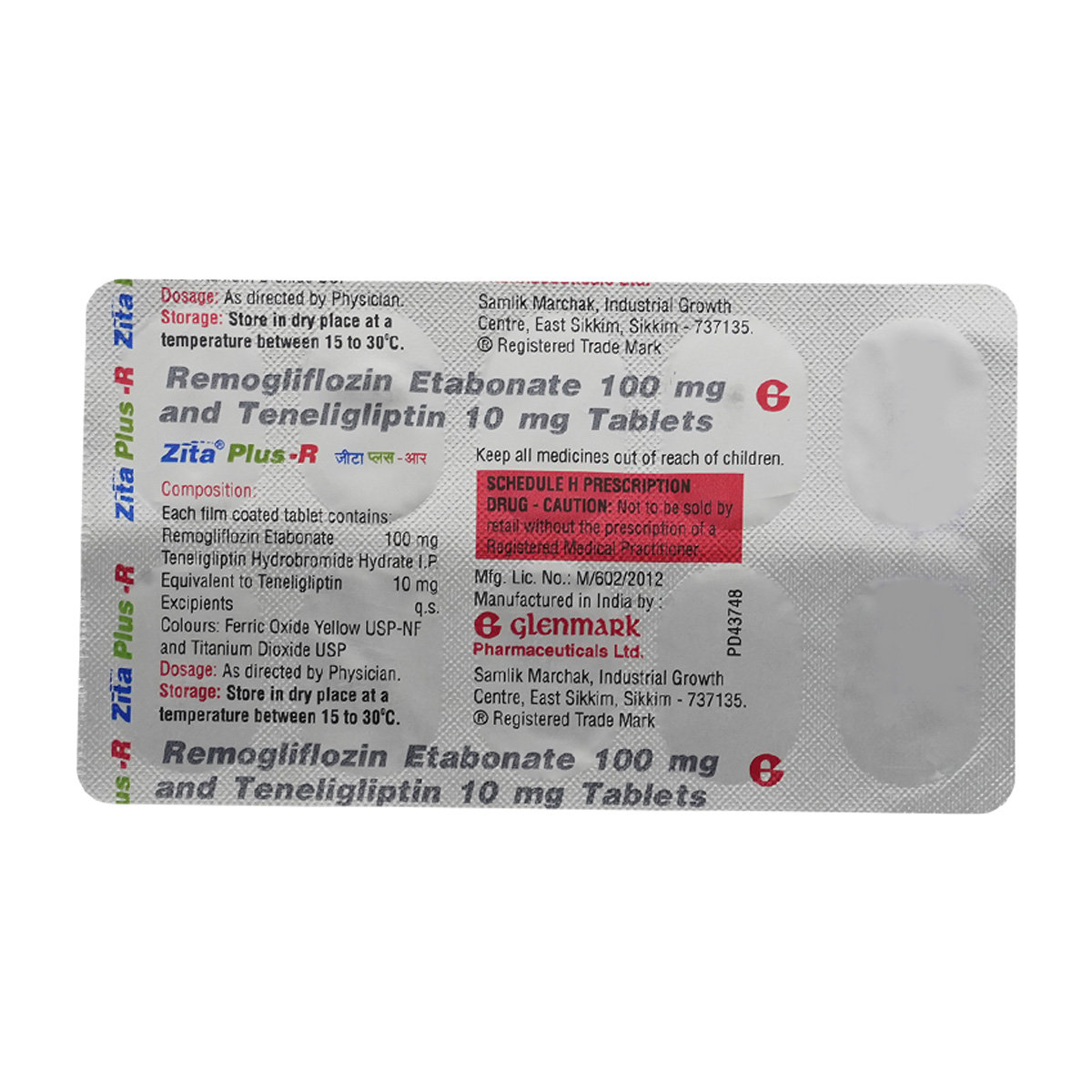Remogliflozin Etabonate+teneligliptin
About Remogliflozin Etabonate+teneligliptin
Remogliflozin Etabonate+teneligliptin belongs to the anti-diabetic medicines used to treat type-2 diabetes mellitus. Type-2 diabetes mellitus is a medical condition in which blood glucose levels are above normal due to insulin deficiency, insulin resistance, or both.
Remogliflozin Etabonate+teneligliptin contains Remogliflozin etabonate and Teneligliptin. Remogliflozin etabonate helps in removing excess sugar from the body via urine. Teneligliptin works by decreasing the hormones that raise blood glucose levels and increasing insulin release from the pancreas. Together, Remogliflozin Etabonate+teneligliptin helps control the blood sugar levels.
In some cases, Remogliflozin Etabonate+teneligliptin may cause side effects such as stomach upset, diarrhoea, headache, nausea, and vomiting. Most of these side effects may not require medical attention and resolve gradually over time. However, you are advised to consult the doctor if the side effects persist or worsen.
Let the doctor know if you are allergic to any of the components in Remogliflozin Etabonate+teneligliptin. Consult the doctor if you are pregnant or breastfeeding. Keep the doctor informed about your health condition and medications to avoid unpleasant side effects/interactions.
Uses of Remogliflozin Etabonate+teneligliptin
Medicinal Benefits
Remogliflozin Etabonate+teneligliptin combines two anti-diabetic drugs, Remogliflozin etabonate and Teneligliptin. Remogliflozin Etabonate+teneligliptin is used to treat type-2 diabetes mellitus. Remogliflozin etabonate helps in removing excess sugar from the body via urine. Teneligliptin works by decreasing the hormones that raise blood glucose levels and increasing insulin release from the pancreas. Together, Remogliflozin Etabonate+teneligliptin helps control the blood sugar levels.
Directions for Use
- Take Remogliflozin Etabonate+teneligliptin with or without food or as advised by a doctor.
- Follow your doctor's instructions on the dosage and timing of this medication, to ensure the safety.
- Swallow the medicine as a whole with a glass of water.
- Do not crush, break, or chew it.
Storage
Side Effects of Remogliflozin Etabonate+teneligliptin
- Stomach upset
- Diarrhoea
- Headache
- Nausea
- Vomiting
Drug Warnings
Do not take Remogliflozin Etabonate+teneligliptin if you are allergic to any of its components. Inform the doctor if you have diabetic ketoacidosis, diabetic coma or pre-coma, type 1 diabetes, acute pancreatitis, heart problems, low blood sugar, intestinal obstruction, or kidney or liver problems. Consult the doctor if you are pregnant or breastfeeding. Let the doctor know if you take other medicines, including supplements or herbal products.
Drug Interactions
Drug-Drug Interactions: Inform the doctor if you are taking anti-diabetic drugs, hormones, or anti-arrhythmic agents.
Drug-Food Interactions: No interactions found/established.
Drug-Disease Interactions: Inform the doctor if you have diabetic ketoacidosis, low blood sugar levels, or kidney or liver problems.
Drug-Drug Interactions Checker List:
Safety Advice

Alcohol
consult your doctorIt is unknown if alcohol interacts with Remogliflozin Etabonate+teneligliptin. Please consult the doctor.

Pregnancy
cautionPlease consult the doctor if you are pregnant; your doctor will decide whether pregnant women can take Remogliflozin Etabonate+teneligliptin or not.

Breast Feeding
cautionPlease consult the doctor if you are breastfeeding; your doctor will decide whether Remogliflozin Etabonate+teneligliptin can be given to breastfeeding mothers or not.

Driving
consult your doctorIt is not known if Remogliflozin Etabonate+teneligliptin affects your ability to drive. Drive or operate machinery only if you are alert.

Liver
consult your doctorPlease consult the doctor if you have a liver impairment or any concerns regarding this.

Kidney
consult your doctorPlease consult the doctor if you have kidney impairment or any concerns.

Children
consult your doctorLimited information is available. Please consult the doctor if you have any concerns regarding the usage of Remogliflozin Etabonate+teneligliptin in children.
Habit Forming
Diet & Lifestyle Advise
- Include fruits, vegetables, and whole grains in your diet.
- Limit sugar, salt and fat intake.
- Follow a healthy diet and try to stay active.
- Avoid missing meals.
- Rest properly and avoid stress by doing meditation or yoga.
- Limit smoking and alcohol consumption.
Special Advise
- Regularly monitor blood glucose levels.
- Try not to skip any doses and take Remogliflozin Etabonate+teneligliptin for as long as your doctor has prescribed it for you.
Patients Concern
Disease/Condition Glossary
Type-2 diabetes mellitus: Type-2 diabetes mellitus, also known as non-insulin-dependent diabetes, is a chronic or lifelong disease that keeps the body from utilising insulin (a hormone which controls sugar levels in the blood) properly. It is a medical condition in which blood glucose levels are above normal. People with type 2 diabetes either do not produce enough insulin, or the insulin produced cannot perform its function in the body (insulin resistance). Middle-aged or older individuals are most likely to suffer from type 2 diabetes; hence, it is also known as adult-onset diabetes. Type 2 diabetes symptoms include lack of energy, tiredness, frequent urination, excess thirst, dry mouth, blurry vision, constant hunger, weight loss, and itchy skin.
FAQs
Remogliflozin Etabonate+teneligliptin is used to treat Type-2 diabetes mellitus.
Remogliflozin Etabonate+teneligliptin helps remove excess sugar from the body via urine, decreases the hormones that raise blood glucose levels and increases insulin release from the pancreas.
Do not stop taking Remogliflozin Etabonate+teneligliptin without consulting your doctor on your own, as it may cause a rise in blood glucose levels. Continue taking Remogliflozin Etabonate+teneligliptin for as long as your doctor has prescribed it to you. Do not hesitate to speak with your doctor if you experience difficulty taking Remogliflozin Etabonate+teneligliptin.
Hypoglycaemia/low blood sugar may occur in some people. Consume sugary foods or drinks if you experience symptoms of hypoglycaemia, such as fatigue, excess sweating, shakiness, irritability, nausea or vomiting.



